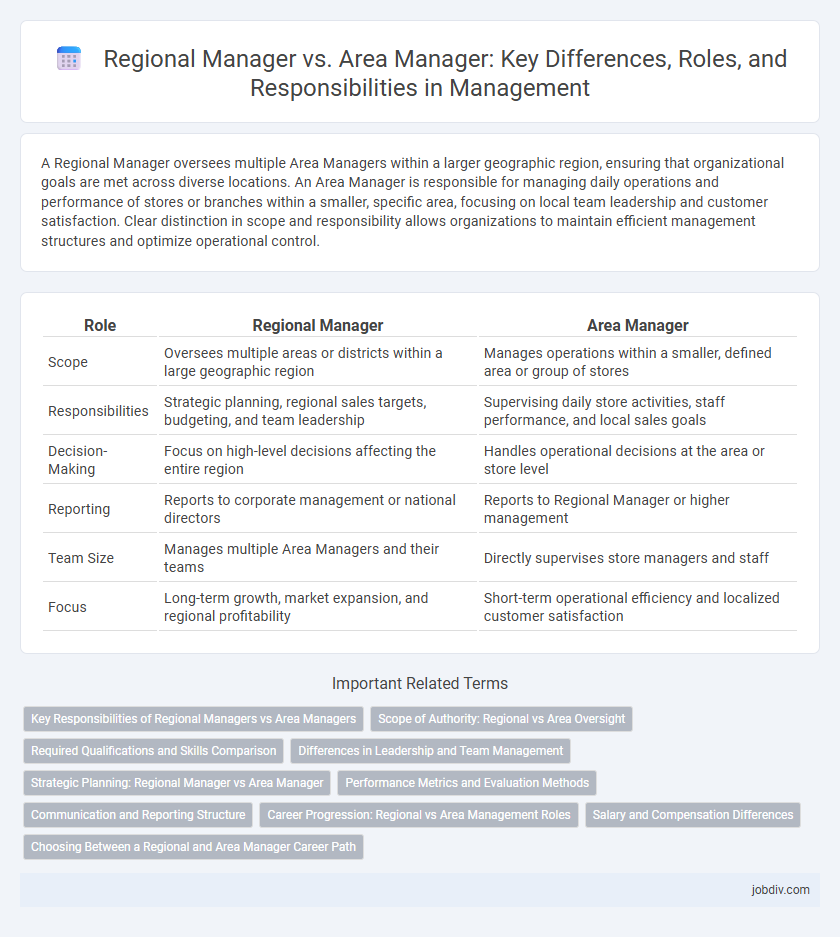A Regional Manager oversees multiple Area Managers within a larger geographic region, ensuring that organizational goals are met across diverse locations. An Area Manager is responsible for managing daily operations and performance of stores or branches within a smaller, specific area, focusing on local team leadership and customer satisfaction. Clear distinction in scope and responsibility allows organizations to maintain efficient management structures and optimize operational control.
Table of Comparison
| Role | Regional Manager | Area Manager |
|---|---|---|
| Scope | Oversees multiple areas or districts within a large geographic region | Manages operations within a smaller, defined area or group of stores |
| Responsibilities | Strategic planning, regional sales targets, budgeting, and team leadership | Supervising daily store activities, staff performance, and local sales goals |
| Decision-Making | Focus on high-level decisions affecting the entire region | Handles operational decisions at the area or store level |
| Reporting | Reports to corporate management or national directors | Reports to Regional Manager or higher management |
| Team Size | Manages multiple Area Managers and their teams | Directly supervises store managers and staff |
| Focus | Long-term growth, market expansion, and regional profitability | Short-term operational efficiency and localized customer satisfaction |
Key Responsibilities of Regional Managers vs Area Managers
Regional Managers oversee multiple area managers, focusing on strategic planning, budget allocation, and ensuring overall regional performance aligns with corporate goals. Area Managers manage day-to-day operations of specific stores or branches within their designated area, emphasizing staff management, local marketing initiatives, and meeting sales targets. The distinction lies in regional managers setting broader objectives and area managers executing operational plans within those parameters.
Scope of Authority: Regional vs Area Oversight
Regional Managers oversee multiple Area Managers and are responsible for the strategic direction and overall performance of several areas within a larger geographic region. Area Managers concentrate on day-to-day operations, managing individual stores or branches within a specific area, ensuring compliance with company policies and operational goals. The scope of authority for Regional Managers is broader and more strategic, while Area Managers have a narrower, operational focus within a defined locality.
Required Qualifications and Skills Comparison
Regional Managers typically require a bachelor's degree in business administration or a related field alongside 5-7 years of leadership experience, emphasizing strategic planning, financial analysis, and cross-functional team management. Area Managers generally need 3-5 years of supervisory experience with strong operational expertise, customer relationship skills, and proficiency in performance metrics tracking. Both roles demand excellent communication, problem-solving abilities, and proficiency in data-driven decision-making to support organizational goals.
Differences in Leadership and Team Management
A Regional Manager oversees multiple Area Managers and is responsible for strategic leadership, large-scale operational decisions, and aligning regional goals with corporate objectives. In contrast, an Area Manager focuses on direct team supervision, managing day-to-day activities, and ensuring local sales targets and customer service standards are met. The Regional Manager emphasizes high-level coordination and cross-area performance, while the Area Manager prioritizes hands-on team management and tactical execution.
Strategic Planning: Regional Manager vs Area Manager
Regional Managers oversee broader geographic territories, developing and implementing high-level strategic plans that align with corporate goals and market trends across multiple areas. Area Managers focus on tactical execution of strategies within specific districts, ensuring operational objectives and local market demands are met effectively. The distinction lies in scope: Regional Managers prioritize macro-level strategic planning, while Area Managers emphasize localized operational alignment and performance.
Performance Metrics and Evaluation Methods
Regional Managers typically oversee multiple Area Managers and focus on broader performance metrics such as overall sales growth, market share expansion, and regional profitability. Area Managers concentrate on more granular evaluation methods including individual store performance, employee productivity, and customer satisfaction scores within specific geographic areas. Both roles utilize key performance indicators (KPIs) but differ in scope, with Regional Managers analyzing aggregated data trends and Area Managers conducting hands-on operational assessments.
Communication and Reporting Structure
Regional Managers oversee multiple Area Managers, establishing a hierarchical communication flow that ensures consistent strategy implementation across several locations. Area Managers report directly to Regional Managers, providing detailed operational updates and key performance indicators from their specific territories. Efficient communication and a clear reporting structure between these roles enhance decision-making, accountability, and organizational alignment.
Career Progression: Regional vs Area Management Roles
Career progression from Area Manager to Regional Manager typically involves overseeing a larger geographic territory with increased strategic responsibilities, including managing multiple area teams and aligning operations with corporate goals. Regional Managers focus on high-level planning, cross-area coordination, and performance metrics, while Area Managers prioritize day-to-day operations and direct supervision of store or branch managers within their specific area. Advancement requires strong leadership, advanced analytical skills, and the ability to drive regional growth and profitability across diverse markets.
Salary and Compensation Differences
Regional Managers typically earn higher salaries than Area Managers due to broader responsibilities overseeing multiple locations within a large geographic area. Compensation packages for Regional Managers often include performance bonuses, stock options, and higher base pay reflecting their strategic role. Area Managers receive competitive salaries focused on operational management of fewer sites, with bonuses tied closely to local performance metrics.
Choosing Between a Regional and Area Manager Career Path
Selecting between a Regional Manager and Area Manager career path depends on the scope of responsibilities and leadership focus; Regional Managers oversee multiple areas or districts, driving strategy and performance across broader geographic regions. Area Managers concentrate on managing specific locations or stores within a defined territory, emphasizing operational efficiency and team management. Career advancement as a Regional Manager often requires strong strategic planning and multi-unit leadership skills, while Area Managers benefit from hands-on operational expertise and direct employee engagement.
Regional Manager vs Area Manager Infographic

 jobdiv.com
jobdiv.com